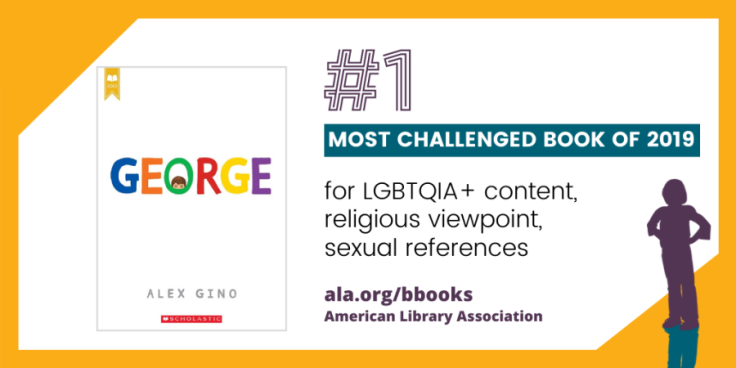Banned Books Week 2020: LGBT Stories Dominate List Of Challenged Books
It’s time to celebrate the freedom to read during Banned Books Week from Sept. 27-Oct. 3. The American Library Association (ALA) Office for Intellectual Freedom tracks challenges to library, school, and university materials and services. Last year, the most challenged books mostly dealt with LGBT issues. Challengers largely had issues with gay or trans characters portrayed in children’s literature.
“George” by Alex Gino was “challenged, banned, restricted, and hidden to avoid controversy,” ALA says. The book follows a young transgender girl, Melissa, but the rest of the world views the fourth-grader as George, a boy.
Those who wanted to ban the book, recommended for grades 3-8, cited the transgender character as well as general LGBTQIA+ content. One complaint said libraries shouldn’t “put books in a child’s hand that require discussion.” Religious reasons were also given.

“Beyond Magenta: Transgender Teens Speak Out” is a nonfiction book where author Susan Kuklin interviewed six trans or gender-neutral teenagers before, during, and after coming out. It was challenged for LGBTQIA+ content, of course. One complaint cited “its effect on any young people who would read it,” and others had concerns that it was sexually explicit and biased.
“A Day in the Life of Marlon Bundo” by Jill Twiss, illustrated by EG Keller is based on an idea created by “Last Week Tonight With John Oliver.” The book follow Vice President Mike Pence’s rabbit as falls in love with another rabbit, Wesley. It’s a parody of a book that Pence’s daughter Charlotte and wife Karen wrote, “Marlon Bundo's A Day in the Life of the Vice President.”
ALA says the book was both challened and vandalized. Challengers took issue with LGBTQIA+ content and political viewpoints. They also claimed it is “designed to pollute the morals of its readers,” and needs a content warning.
“Sex is a Funny Word” by Cory Silverberg, illustrated by Fiona Smyth, is a comic book that teaches children ages 8-10 about their bodies, gender and sexuality.
Silverberg’s educational book has been challenged, banned, and relocated for, yet again, LGBTQIA+ content. Censors also didn’t like the discussion of gender identity and sex education and claimed the content was “inappropriate.”
“Prince & Knight” by Daniel Haack, illustrated by Stevie Lewis, was challenged and restricted. The picture book shows a prince and knight battling a dragon and falling in love, ending with a wedding.
Challengers took issue with the presence of gay marriage and LGBTQIA+ content, said it conflicted with a religious viewpoint and called the book “a deliberate attempt to indoctrinate young children.” The ALA says complaints also claimed it had the “potential to cause confusion, curiosity, and gender dysphoria,”

“I Am Jazz” by Jessica Herthel and Jazz Jennings, illustrated by Shelagh McNicholas, is a picture book about trans activist Jazz Jennings. LGBTQIA+ content, a transgender character and subject matter that is “sensitive, controversial, and politically charged” were reasons cited by those who wanted it banned. It was ultimately relocated after being challenged.
“Drama” written and illustrated by Raina Telgemeier is a graphic novel about Callie, a middle school student helping bring the annual musical to life. Like the other titles, it was challenged for LGBTQIA+ content. Those who wanted it banned (though they didn’t succeed, claimed the book was against “family values/morals.”
“And Tango Makes Three” by Peter Parnell and Justin Richardson, illustrated by Henry Cole, follows two male penguins as they build a family together. The book came out in 2005 and has been a point of contention in many libraries ever since. Last year, it was challenged and relocated for—you guessed it—LGBTQIA+ content.
Of the ALA’s top 10 most challenged books from 2019, only two lacked references to gay or trans topics.
J.K. Rowling’s “Harry Potter” series was “banned and forbidden from discussion for referring to magic and witchcraft, for containing actual curses and spells, and for characters that use ‘nefarious means’ to attain goals.” For the record, Rowling’s series about the boy wizard is fictional, as are the curses and spells in the story.
Margaret Atwood’s “The Handmaid’s Tale” was banned and challenged for profane language as well as “vulgarity and sexual overtones.” The dystopian novel follows a woman who is forced to be a sex slave when fertile women become a rarity.
© Copyright IBTimes 2024. All rights reserved.





















